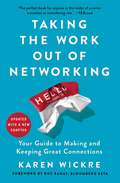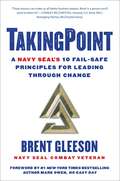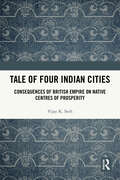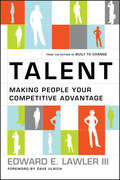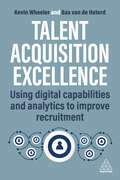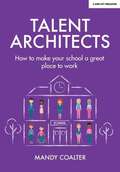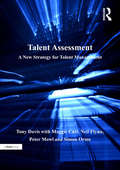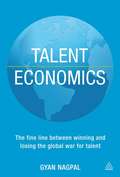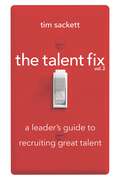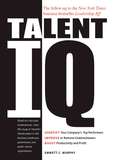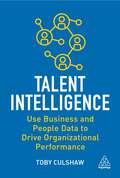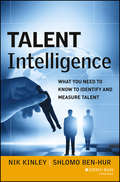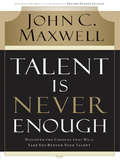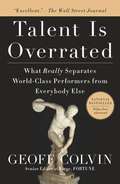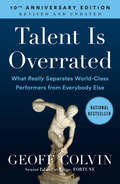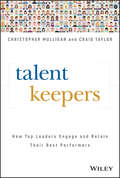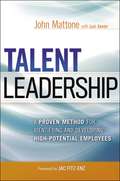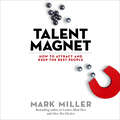- Table View
- List View
Taking the Work Out of Networking: An Introvert's Guide to Making Connections That Count
by Karen Wickre&“For introverts who panic at the idea of networking, Wickre&’s book is a deep, calming breath.&” —Sophia Dembling, author of The Introvert&’s Way Former Google executive, editorial director of Twitter, self-described introvert, and &“the best-connected Silicon Valley figure you&’ve never heard of&” (Walt Mossberg, Wall Street Journal), offers networking advice for anyone who has ever canceled a coffee date due to social anxiety. Learn to nurture a vibrant circle of reliable contacts without leaving your comfort zone.Networking has garnered a reputation as a sort of necessary evil. Some people relish the opportunity to boldly work the room, introduce themselves to strangers, and find common career ground—but for many others, the experience is awkward, or even terrifying. The common networking advice for introverts are variations on the theme of overcoming or &“fixing&” their quiet tendencies. But Karen Wickre is a self-described introvert who has worked in Silicon Valley for thirty years. She shows you how to embrace your quiet nature and &“make genuine connections that last, that we can nurture across the world for all kinds of purposes&” (Chris Anderson, head of TED). Karen&’s &“embrace your quiet side&” approach is for anyone who finds themselves shying away from traditional networking activities, or for those who would rather be curled up with a good book on a Friday night than out at a party. With compelling arguments and creative strategies, this &“practical, easy-to-use&” (Sree Sreenivasan, former chief digital officer of Columbia University) book is a perfect guide.
TakingPoint: A Navy SEAL's 10 Fail Safe Principles for Leading Through Change
by Mark Owen Brent GleesonDecorated Navy SEAL, successful businessman and world-renowned speaker Brent Gleeson shares his revolutionary approach to navigating and leading change in the workplace—with a foreword by #1 New York Times bestselling author Mark Owen.Inspired by his time as a Navy SEAL and building award-winning organizations in the business world, Brent Gleeson has created a powerful roadmap for today’s existing and emerging business leaders and managers to improve their ability to successfully navigate organizational change. Over the past ten years since leaving the SEAL Teams, Gleeson has become a well-respected thought leader and expert in business transformation. He has spoken to and consulted with hundreds of organizations across the globe and inspired thousands of business leaders through his highly insightful philosophies on leadership, culture and building high-performance teams that achieve winning results. In TakingPoint, Gleeson shares his ten-step program that he has implemented in his own companies and for his high-profile clients—giving leaders and managers actionable insights and a framework for successful execution. TakingPoint brilliantly captures the structures, behaviors and mindsets required to build successful twenty-first century organizations. With a strong emphasis on communication, culture, engagement, accountability, trust, and resiliency, Gleeson’s methods have helped hundreds of companies around the world transform the way they think about change, and can help yours do the same. For the last five years, Gleeson has shared his philosophies through his weekly columns on Forbes and Inc. And now, for the first time ever, they are captured in this entertaining and highly prescriptive book. Steps include: -Culture: The Single Most Important Enabler -Trust: Fueling the Change Engine -Accountability: Ownership at All Levels -Mindset: Belief in the Mission -Preparation: Gathering Intelligence and Planning the Mission -Transmission: Communicating the Vision -Inclusion: The Power of Participation and Acceptance -Fatigue: Managing Fear and Staying Energized -Discipline: Focus and Follow-Through -Resiliency: The Path of Lasting Change Never has change been more consistent and disruptive as it is now. Business leaders and managers at all levels can’t just react to change. They have to lead change. They have to take point.
Talbots: A Classic
by V. Kasturi Rangan Marie BellThis case traces why the $1 billion women's clothing retailer, decided to, attract younger customers, what went wrong, and the actions taken to recover. By the end of 1999, the company has reestablished itself and faces several growth opportunities and must decide on the best course of action.
Tale Of Four Indian Cities: Consequences of British Empire on Native Centres of Prosperity
by Vijay K. SethTale of Four Indian Cities presents a vivid picture of how the British political regime reorganized the structure of the Indian economy to suit its own objectives. While doing so, the regime also affected the geographical distribution of economic activities. This resulted in the decline of native cities and the increased prosperity of colonial cities.To reveal how British colonial power brought about such changes in the Indian subcontinents, the book narrates the account of two pairs of native and colonial cities – Dacca and Calcutta from the Indian Eastern coast, and Surat and Bombay from the Western coast. These were major centres of manufacturing, shared a common history and experienced the consequences of three different political dispensations – the Mughal Empire, the East India Company and the British Raj.Accessibly written, the volume will be of great interest to students, scholars and researchers of Indian colonial business and economic history. It will also be of interest to the general reader.
Tale of Two Airlines in the Network Age: Or Why the Spirit of King George III Is Alive and Well
by F. Warren McfarlanIntroduces issues of new service standards in an information-intensive world.
Tale of Two Electronic Components Distributors
by Ananth Raman Bharat P. RaoDiscusses the role of distribution intermediaries in the electronic components industry, and describes operations at two of these distributors. Serves as a vehicle to discuss the functions provided by distributors in the channel. Also lets students understand the differences between the distributors and discuss how each of them is going to deal with issues like consolidation and the rapid growth of the Internet. Also introduces students to the complexity of managing operations at a small distributor.
Talent
by Dave Ulrich Edward E. Lawler IIIThe source of competitive advantage has shifted in many organizations from reliability to innovation and flexibility. But what does it take for an organization that innovates to then manage effectively? In this follow-up to Built to Change, Ed Lawler argues that it is a combination of the right structure and the right people. First, organizations must decide what structure they are: are you a high-involvement organization that has products and services that require a high level of coordination and cooperation among employees? Or do you have a more global competitor structure in which you are constantly bringing in new talent and technological expertise? Are you a mixture of both? Lawler outlines the unique human capital strategy for each approach, shows what it looks like in action, and provides the foundation and tools for creating competitive and innovative organizations.
Talent Acquisition Excellence: Using Digital Capabilities and Analytics to Improve Recruitment
by Kevin Wheeler Bas van HaterdAre talent acquisition technologies really making a difference? Which capabilities should I care about and how do I use them? Are recruitment analytics necessary?Talent Acquisition Excellence answers all these questions and more. Written for recruiters and Talent Acquisition (TA) specialists, this book outlines which technologies and digital capabilities are available and explains how to use them as well as how to assess what impact they can have on your organization's recruitment activities. It includes coverage of artificial intelligence (AI), algorithms, automation and machine learning and also has broader discussion of the talent supply chain and talent intelligence. This book also explores technology for sourcing, employer branding and job adverts as well as digital pre-selection, video interviewing and virtual apprenticeships. The final part of the book is dedicated to analytics and explains what to measure and why, the difference between predictive and prescriptive analytics in recruitment and showcases what a data-driven approach to recruitment can help you to achieve. Throughout the book there is essential discussion of the ethics of using technologies and analytics in recruitment as well as a focus on the skills needed to be a future-proof recruiter. Each chapter includes an example scenario to put the capability in context as well as case studies from organizations in the US, UK, Europe and the Middle East. Talent Acquisition Excellence is ideal reading for all recruiters and talent acquisition professionals who need to understand the digital possibilities in the industry.
Talent Architects: How to make your school a great place to work
by Mandy CoalterMandy Coalter draws on her extensive HR experience in the schools sector and beyond to support you to build a great place to work where everyone can excel in the interests of the children. She provides practical tips and support that will help to improve staff retention, performance and engagement, while tackling topics such as addressing teacher workload, what really motivates and retains staff and the crucial role that leaders play in ensuring great people management in schools. Insightful, captivating and authentic, Mandy suggests fresh and practical new ideas and opportunities to strengthen your school and teachers, better equipping them to support their pupils.
Talent Architects: How to make your school a great place to work
by Mandy CoalterMandy Coalter draws on her extensive HR experience in the schools sector and beyond to support you to build a great place to work where everyone can excel in the interests of the children. She provides practical tips and support that will help to improve staff retention, performance and engagement, while tackling topics such as addressing teacher workload, what really motivates and retains staff and the crucial role that leaders play in ensuring great people management in schools. Insightful, captivating and authentic, Mandy suggests fresh and practical new ideas and opportunities to strengthen your school and teachers, better equipping them to support their pupils.
Talent Assessment: A New Strategy for Talent Management
by Tony Davis Maggie Cutt Neil Flynn Peter MowlTalented and ambitious people will only stay with their current employer if they are offered positive development, motivation and nurturing to ensure they are given every chance of realizing their potential. Simple financial packages, although superficially attractive, often assuage a short term need but rarely cater for the long-term requirements of a talented person. Talent Assessment demonstrates how to manage the needs of the individual employees and those of the organization in parallel; how to identify the aspirational and development needs of potential top performers and how to manage them sensibly. This involves using techniques to assess their mindsets, behaviours and skills and then providing effective training, development and performance management interventions. IT is an increasingly important support and enabler of this kind of process and the authors provide guidance on the process and content required for a talent management database. There is also a chapter exploring the critical operation role of HR in talent management. The book is filled with practical examples and mini-case studies to help you apply the various techniques. It provides positive, practical guidelines to encourage you to implement a suitable talent management programme as well as introducing more advanced aspects of the subject, particularly in terms of assessing suitable candidates for this way of managing your organization's future.
Talent Economics
by Gyan NagpalThis book looks at the circumstances surrounding talent today. It also asks business leaders to step back and understand the global talent landscape, before translating this understanding into strategy. It is in this area that economic inquiry as a disciple can be invaluable to human resource management, as simply put - economics is the study of how the forces of supply and demand allocate scarce resources. Talent Economics is an interdisciplinary viewpoint, which seeks to bring workforce analysis, management practice and strategy together. The specific aim is to spark greater inquiry and understanding of - 1. The Macro talent realities of supply and demand within a country's labour force. 2. The Micro talent trends which help us understand how the 21st century employment relationship is changing.
Talent Fix Volume 2: A Leader's Guide to Recruiting Great Talent
by Tim SackettCorporate recruiting has been broken for decades, but fixing it is easier than you think. The Talent Fix offers a practical, scalable blueprint for transforming talent acquisition into a strategic, results-driven function. With step-by-step guidance and real-world stories from top-performing organizations, the book shows how to apply simple organizational designs, technologies and best practices to dramatically improve recruiting outcomes. Whether you're starting from scratch or optimizing an existing function, this guide helps HR leaders and recruiters build the systems and culture needed to consistently attract top talent.Smart, straightforward and packed with proven solutions, it's the playbook every talent acquisition leader needs.
Talent Holds the Key: Winning in China
by Jonathan Woetzel Jimmy HexterInside multinational companies that are playing to win in China, there is growing recognition that having a balance of global and local staff for important positions is effective for achieving the kind of creative insights needed to make fast, competitive judgments.
Talent IQ
by Emmett C. MurphyTalent is a company's most valuable resource. Today, more than ever, the fate of your organization depends on your ability to recruit, retain, and, when necessary, replace talent. By the same token, talent management determines the success or failure of your own career. Talent IQ teaches you how to make the most of your own, your team's, and your organization's talent - from junior support staff to C-level executives. Based on an extensive ten-year study of best practices among 100,000 TalentLeaders in virtually every type of organizational setting, Talent IQ identifies the concepts, skills, and tools any manager and organization can use to boost their Talent IQ and build a culture of achievement.
Talent IQ
by Emmett C. MurphyTalent is a company's most valuable resource. Today, more than ever, the fate of your organization depends on your ability to recruit, retain, and, when necessary, replace talent. By the same token, talent management determines the success or failure of your own career. Talent IQ teaches you how to make the most of your own, your team's, and your organization's talent - from junior support staff to C-level executives. Based on an extensive ten-year study of best practices among 100,000 TalentLeaders in virtually every type of organizational setting, Talent IQ identifies the concepts, skills, and tools any manager and organization can use to boost their Talent IQ and build a culture of achievement.
Talent IQ: Identify Your Company's Top Performers, Improve or Remove Underachievers, Boost Productivity and Profit
by Emmett C MurphyTalent is a company's most valuable resource. Today, more than ever, the fate of your organization depends on your ability to recruit, retain, and, when necessary, replace talent. By the same token, talent management determines the success or failure of your own career. Talent IQ teaches you how to make the most of your own, your team's, and your organization's talent - from junior support staff to C-level executives. Based on an extensive ten-year study of best practices among 100,000 TalentLeaders in virtually every type of organizational setting, Talent IQ identifies the concepts, skills, and tools any manager and organization can use to boost their Talent IQ and build a culture of achievement.
Talent Intelligence: Use Business and People Data to Drive Organizational Performance
by Toby CulshawLeverage the power of Talent Intelligence (TI) to make evidence-informed decisions that drive business performance by using data about people, skills, jobs, business functions and geographies.Improved access to people and business data has created huge opportunities for the HR function. However, simply having access to this data is not enough. HR professionals need to know how to analyse the data, know what questions to ask of it and where and how the insights from the data can add the most value. Talent Intelligence is a practical guide that explains everything HR professionals need to know to achieve this. It outlines what Talent Intelligence (TI) is why it's important, how to use it to improve business results and includes guidance on how HR professionals can build the business case for it.This book also explains how and why talent intelligence is different from workforce planning, sourcing research and standard predictive HR analytics and shows how to assess where in the organization talent intelligence can have the biggest impact and how to demonstrate the results to all stakeholders. Most importantly, this book covers KPIs and metrics for success, short-term and long-term TI goals, an outline of what success looks like and the skills needed for effective Talent Intelligence. It also features case studies from organizations including Philips, Barclays and Kimberly-Clark.
Talent Intelligence: What You Need to Know to Identify and Measure Talent
by Shlomo Ben-Hur Nik KinleyThe challenge with most companies' talent intelligence is that it is just not that intelligent. Having good talent intelligence—an accurate understanding of the skills, expertise, and qualities of people—is essential for the people decisions that all businesses make. Yet despite its vital importance, most organizations appear to be failing at this critical task. The reason lies in talent measurement: how companies produce their talent intelligence and then use it. Written by Nik Kinley and Shlomo Ben-Hur—two experts in the field—this book draws on the latest research to show how businesses can transform the value and impact of their talent intelligence to make sure they get the right people in the right roles. When that happens, all their talent management and development activities are built on an accurate understanding of the talent available to them. Filled with illustrative examples, the book shows how to overcome the stumbling blocks that stand in the way of successful talent intelligence and reveals step-by-step what organizations need to measure, how they can best do so, and how they can successfully implement measurement and use the results. As the authors explain, knowing what methods and tools to use is just part of the challenge: the bigger issue for many firms is ensuring they know how to use them and make the best use of the intelligence they provide.
Talent Is Never Enough
by John MaxwellNew York Times best-selling author Dr. John C. Maxwell has a message for you, and for today's corporate culture fixated on talent above all else: TALENT IS NEVER ENOUGH. People everywhere are proving him right. Read the headlines, watch the highlights, or just step out your front door: Some talented people reach their full potential, while others self-destruct or remain trapped in mediocrity. What makes the difference? Maxwell, the go-to guru for business professionals across the globe, insists that the choices people make-not merely the skills they inherit-propel them onto greatness. Among other truths, successful people know that: Belief lifts your talent. Initiative activates your talent. Focus directs your talent. Preparation positions your talent. Practice sharpens your talent. Perseverance sustains your talent. Character protects your talent. . . . and more!! It's what you add to your talent that makes the greatest difference. With authentic examples and time-tested wisdom, Maxwell shares thirteen attributes you need to maximize your potential and live the life of your dreams. You can have talent alone and fall short of your potential. Or you can have talent plus, and really stand out.
Talent Is Overrated: What Really Separates World-Class Performers from Everybody Else
by Geoff ColvinThe stories of extraordinary people who never stopped challenging themselves and who achieved world-class greatness through deliberate practice, including Benjamin Franklin, comedian Chris Rock, football star Jerry Rice, and top CEOs Jeffrey Immelt and Steven Ballmer.
Talent Is Overrated: What Really Separates World-Class Performers from Everybody Else
by Geoff ColvinExpanding on a landmark cover story in Fortune, a top journalist debunks the myths of exceptional performance. One of the most popular Fortune articles in many years was a cover story called What It Takes to Be Great. Geoff Colvin offered new evidence that top performers in any field--from Tiger Woods and Winston Churchill to Warren Buffett and Jack Welch--are not determined by their inborn talents. Greatness doesn't come from DNA but from practice and perseverance honed over decades. And not just plain old hard work, like your grandmother might have advocated, but a very specific kind of work. The key is how you practice, how you analyze the results of your progress and learn from your mistakes, that enables you to achieve greatness. Now Colvin has expanded his article with much more scientific background and real-world examples. He shows that the skills of business, negotiating deals, evaluating financial statements, and all the rest obey the principles that lead to greatness, so that anyone can get better at them with the right kind of effort. Even the hardest decisions and interactions can be systematically improved. This new mind-set, combined with Colvin's practical advice, will change the way you think about your job and career and will inspire you to achieve more in all you do.From the Hardcover edition.
Talent Keepers: How Top Leaders Engage and Retain Their Best Performers
by Craig Taylor Christopher MulliganAchieve higher levels of workforce engagement and retain more employees A strong U.S. economy with record-low unemployment rates and the shift to Millennials—now the largest generation in the workforce—are driving specific challenges for organizations to engage and retain employees. Engaged employees don't just happen, they are nurtured by organizations with great cultures and strong leadership. Talent Keepers puts a new spin on a systematic approach to employee engagement and retention with precise tactics that have achieved proven results. This book includes research-based methods of engaging employees, beginning the moment they are hired. With six client case studies that focus on how the organization put an engagement plan into practice and achieved success, readers will come away with specific, actionable strategies they can begin implementing immediately in their organization. • Put an engagement plan into action • Find actionable strategies • Implement ways to retain your best employees • Achieve success starting today If you’re a top leader looking to engage and retain your best performers, Talent Keepers has you covered.
Talent Leadership: A Proven Method for Identifying and Developing High-Potential Employees
by John MattoneGreat leaders drive the bottom line, which is why organizations pour money into leadership development. But most companies have no real way to gauge whether their endeavors are paying off - much less where they are falling short. Talent Leadershipshows how to set up a world-class leadership-development program - and have the metrics to prove it!Packed with research findings, best practices, case studies, proprietary assessments, and more, this innovative book explains how to: * Employ assessments to benchmark current and future executive talent * Use the resulting data to identify leaders with potential based on their capabilities, commitment, and alignment with organizational goals * Leverage analysis to target training and coaching where they will have the greatest impact on individual performance and overall operating success By measuring, calibrating, and recalibrating the leading indicators that directly predict organizational health and the ability of leaders to meet those needs, HR and OD professionals will bring a much-needed numbers focus to theircrucial talent development efforts. This book is for leaders of HR, Talent Management, OD/MD professionals, and the vast population of operating managers who are charged with identifying, managing and developing high-potential and emerging leaders.
Talent Magnet: How to Attract and Keep the Best People
by Mark MillerThe Wall Street Journal-bestselling author &“provides a pragmatic approach to the art of attracting and retaining top talent . . . A must-read for leaders&” (Candice L. Saunders, President and CEO, WellStar Health System). What Does Top Talent Really Want? More than vision, strategy, creativity, marketing, finance, or even technology, it is ultimately people that determine organizational success. That&’s why virtually every organization wants more top talent. But do you know what they&’re looking for? It might not be what you think! Talent Magnet will show you how to attract and keep great people. &“The war for talent is on, and many good leaders and organizations are really struggling. Talent Magnet presents a terrific approach that is both insightful and actionable—born out of firsthand research and told through a readable and relatable story. I read it straight through.&” —Stephen M. R. Covey, New York Times- and #1 Wall Street Journal-bestselling author of The Speed of Trust &“People drive your success more than anything else, and Mark Miller shows us how to attract the best of them to your company.&” —Randy Street, New York Times-bestselling coauthor of Who &“Great people are going to work somewhere—why not for you? Talent Magnet will show you how to attract the people every organization wants. Read it to take your team and organization to the next level.&” —Jon Gordon, Wall Street Journal-bestselling author of The Energy Bus
